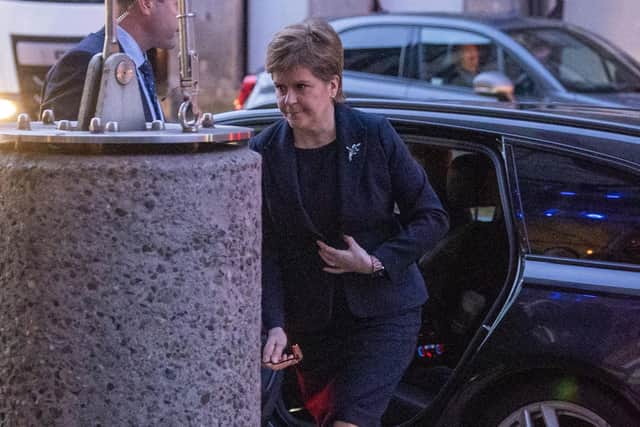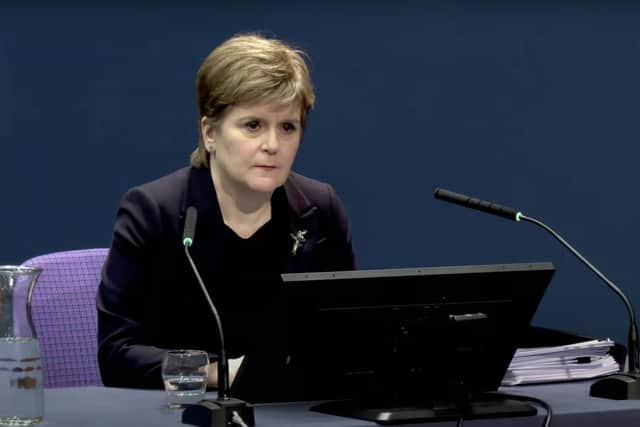Nicola Sturgeon: Emotional former SNP leader leaves more questions than answers, including on WhatsApp and leadership style, after UK Covid-19 Inquiry evidence
It has been less than a year since Nicola Sturgeon’s shock decision to step down as first minister, with the intense scrutiny of the 53 year-old’s leadership during the pandemic among the myriad issues that have cast doubt over her political legacy, with serious concerns reasoned over how decisions were made and a lack of transparency.
Yet even though such a short period of time has passed, it was a different Ms Sturgeon the nation saw today at the UK Covid-19 Inquiry. Compared to the figure who dominated Scottish politics for the best part of a decade, she came across at times as vulnerable and uncertain, as she struggled to provide substantive answers to some of the sharper questions from the inquiry’s lead counsel, Jamie Dawson KC,
Advertisement
Hide AdAdvertisement
Hide AdUnsurprisingly, the opening hours of her eagerly anticipated evidence at the Edinburgh International Conference Centre on Wednesday were largely devoted to intensive questioning about her use of informal messaging. And it did not take long for examples of her questionable use of WhatsApp to emerge.
Having told the inquiry moments before that use of the app was not an “extensive” or “meaningful” part of how she conducted government business or reached decisions, the inquiry was shown a lengthy exchange between her and Liz Lloyd, her former chief of staff, in October 2020.
In it, the two women had discussions about changes to restrictions for the hospitality sector, with the conversation going into granular detail, such as whether the closing time for venues should be 6pm or 8pm, and the availability of alcohol. At one point, having taken Ms Lloyd’s views into account, Ms Sturgeon wrote: “OK we should prob stick with 6.”
Such evidence will no doubt be seized upon by those critics of Ms Sturgeon who assert her use of the app was far more than cursory. For her part, she insisted the exchange in question was an example of how she and Ms Lloyd were “simply talking” about things that would be discussed at Cabinet.
Sometimes, Ms Sturgeon drew on her considerable political acumen to attempt to reframe the discussion, although the deflection was occasionally crude. She spoke at one point of how WhatsApp messages “weren’t retained”, until Mr Dawson swung his bat straight. “But you did delete them?” he asked. Ms Sturgeon responded: “Yes, in the manner I have set out.”


On other occasions, the former SNP leader took a more subtle approach, trying to shift the focus towards her government’s wider communications strategy at the time. Unprompted, she pointed out that she engaged with the public at daily briefings. Those formats, Ms Sturgeon said, were akin to an “open conversation”.
In keeping with her former deputy John Swinney’s evidence on Tuesday, she also moved to downplay suggestions the real heart of power within her government lay with the tight-knit Gold Command group, as opposed to the Cabinet. The former group, she told Mr Dawson, was not a formal governance body. Based on the evidence the inquiry has seen – and significantly, the evidence it has not seen – the jury is out on that
Indeed, Kate Forbes, Ms Sturgeon’s finance secretary, told the inquiry that not only was she not invited to Gold Command meetings in 2020, but that she was unaware of the group’s existence until 2021. Asked about this, Ms Sturgeon said it was a “reasonably fluid” group, and there would have been “nothing to stop” Ms Forbes from attending. It was not her most convincing answer.
Advertisement
Hide AdAdvertisement
Hide AdNeither was her response to questions about a WhatsApp message sent by national clinical director, Professor Jason Leitch, to the-then health secretary, Humza Yousaf, in which he wrote “she actually wants none of us”, a message that appeared to corroborate criticism of Ms Sturgeon’s governance style. There was a glib attempt at humour by Ms Sturgeon, who said there were days when she would have gladly not have seen ministers or senior officials, and that people would have to know Prof Leitch to appreciate his “turn of phrase”.


Ms Sturgeon also seemed to stumble when she sought to parry questions from Mr Dawson about the retention of relevant material from deleted messages. She was, she said, “absolutely sure” that such information would be reflected in the corporate and public records, insisting: “These were, by their very nature, decisions that could not be kept secret, even if we wanted to, which we didn’t.”
But pressed on how much of the information relating to the discussions leading to those decisions was retained, Ms Sturgeon offered only a generic defence. “Contrary to there being any desire on the part of me and my government to keep things secret, I would suggest the opposite was the case during the pandemic,” she replied.
Such focused lines of inquiry seemed to throw Ms Sturgeon, but it was a straight question from Mr Dawson that almost reduced her to tears, when he asked her if she considered herself to be the right first minister for the job. Her voice shaking, Ms Sturgeon said there was “a large part” of her that wished she wasn’t in Scotland’s highest office at the time, but that she strived to be “the best first minister I could be”.
Elsewhere, Ms Sturgeon took her medicine. Mr Dawson referenced the answer she gave to Channel 4 journalist Ciaran Jenkins during a Covid-19 briefing in August 2021, in which she gave her assurances that her WhatsApp messages would be turned over to the hearings, despite knowing at that time they had been destroyed. Ms Sturgeon told the inquiry she apologised if the answer she gave at the time was “not as clear” as it should have been.
After lunch, the inquiry is expected to address the subject of intergovernmental relations between Edinburgh and London. But even at its half-way point, the evidence has already provided plenty of talking points.
Comments
Want to join the conversation? Please or to comment on this article.